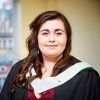
Jessica Mifsud- Bonnici
- Course: MA Social and Cultural History
- Graduation: 2017
Please tell us a bit about yourself and your background.
I grew up in Romford, Essex and was the first in my family to attend university. I studied my undergraduate at the University of Leeds, BA History, where I grew to specialise in Early Modern History, more specifically Early Modern Italian History which I continued onto my Masters. My postgraduate dissertation was entitled 'Eating, Sociability and Individuality in Early Modern Italy', where I focused on the culture of eating and eating habits in 17th and 18th century Italy. I worked for the University, in the Footsteps Fund in the Alumni and Development department as well as working as a student ambassador.
What made you want to apply to your MA course and to Leeds?
I applied to do my MA in the School of History because of the great experience I had in the department as an undergraduate. I received excellent support both academically and pastorally and felt a real part of the community due to my participation in the History Society and through roles I did in the school. I chose social and cultural history after being introduced to the cultural approach in my final year of history in my Special Subject (the topic which helps supports your dissertation’s development), The Cultural History of Venice. I found the sources which cultural historians use, and their way of reading them, incredibly interesting and wished to use this approach in my Masters dissertation.
What is it that makes you passionate about your area of study?
I find the study of history absolutely fascinating. I’m particularly interested in the early modern era as it was a period of great social, economic, political and religious change which is reflected in the way people lived and observed their society. I chose to focus on the history of food, and specifically of food sociability, because sharing a table is the most basic form of community wherein people’s hopes and anxieties are articulated in the way they behaved when eating with others. Understanding the mentalities of the people of the past is a big part of my historical interest.
What aspects of the course did you enjoy the most?
I really enjoyed the core module Concepts and Debates in Social and Cultural History, as it provided a great basis for our research as well as introducing us to various scopes by which to study history including; gender, race and class. It also made us question how we read history and whether we were effectively cultural or social historians. I also really appreciated the freedom to write essays about topics I was interested in. Masters is not like undergraduate where they set you 8 questions from which you choose. Instead, you can write about anything within a given topic area. For instance, in a topic about the Napoleonic and Revolutionary Wars, I wrote about the female expression of patriotism where as other people wrote about military uniforms, military tactics or propaganda.
What would you say about Leeds as a city?
Leeds is a vibrant city, full of culture and industry. It offers a range of things to do including; great shopping, bars and clubs and museums and galleries. We are also half an hour train ride from other – really interesting – days out such as Saltaire, Ilkley, Harrogate and Knaresborough, all places which are rich in historical interest.
What has been the most surprising thing about coming to Leeds?
I was most surprised about how easy it was to settle in to Leeds. Prior to starting my undergraduate in 2013, I had never been any further North than Coventry bar the one open day I visited for Leeds after getting my offer. It became a home away from home, largely due to its great student union where I worked, studied and celebrated after exams in!
What would you say about the learning facilities in your School and at the University in general?
The School of History at the University of Leeds has academics who specialise in a range of topics so you will not find it hard to find someone to supervise your dissertation! In terms of the facilities, the School provides a postgraduate office which I used exclusively to study which is incredibly useful when the library is packed in the exam periods. The University has also introduced a postgraduate floor in the library which means it is easier to find space in which to find support for you research.
What other activities are available for students to take part in outside of their studies, and which ones have you tried out yourself?
I would suggest that all students join the History Society, it really helped me feel a part of the history community. I also helped to run the MA Dissertation Conference, wherein all MA history students present their paper in front of the staff and peers. This gave me experience in event organisation which has been really helpful on my CV.
What do you plan to do now you’ve finished your course, and how do you think the skills and knowledge you’ve developed at Leeds will help with these plans?
I am taking a few years out of education, wishing to work in the public or charity sector to try and broaden my life experience. Eventually, however, I intend to return to Leeds to read for my PhD, using the invaluable research skills I have learned as a MA student.

